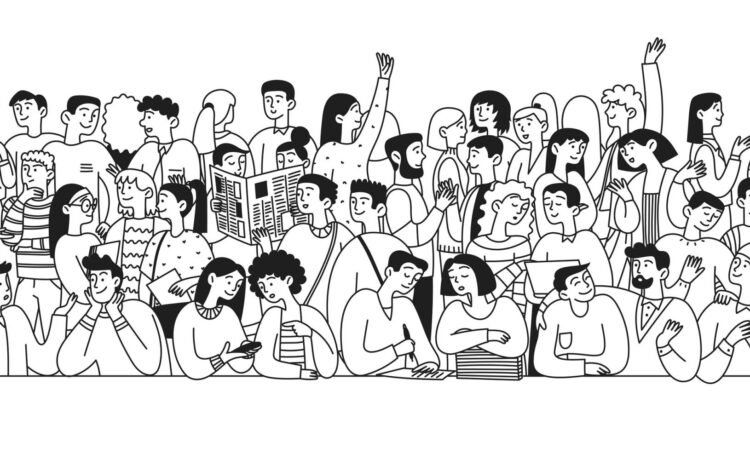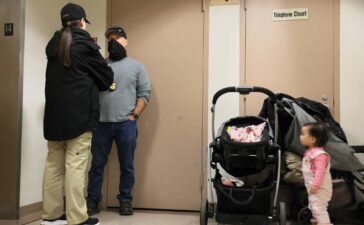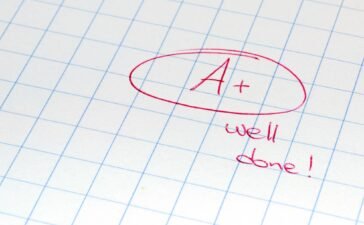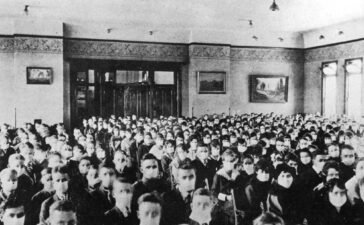“My grandfather once called me wishy-washy, which I interpret as him saying I didn’t really mean it when I said something,” he said. But after joining speech and debate, he improved his communication skills in several ways. “I became more confident, less shy; it got easier to get my point across.”
Learning to Think Critically About Information
Speech and debate can teach students how to think critically about the information they use to build an argument, which. includes learning how to evaluate sources. Fewer young people rely on traditional news, and many Gen Z students get information from social media platforms where algorithms can reinforce existing beliefs. But that approach won’t work in a debate round. Since students are expected to back up their claims with credible sources, they quickly learn the difference between reliable information and content that won’t hold up under scrutiny. If a student cites a TikTok in a debate, their opponent will be quick to call it “not verifiable,” said Priya Garcia, a speech and debate coach at Leland High School
Removing social media as a primary source is one of several ways speech and debate can expand students’ information diets.
“You’re forced to passionately engage in a bunch of research and learn more about the world overall,” said Samit, a twelfth grader from Nueva School. “You aren’t biased by social media because you’ve done the research and advocated for the perspectives that go both for and against that media.”
Students may not always change their minds, but they become more aware of what shapes their thinking as they question their assumptions, consider multiple viewpoints, and build arguments rooted in evidence. “I didn’t keep up with the news when I started high school,” said Tessa, a student at Palo Alto High School who reads the news daily. “Now I feel so much more educated about what’s going on around me.”
Finding the Right Format for Every Student
The range of events available in high school speech and debate clubs allows students to find formats that suit their unique personalities, research styles, and interests. Coach Garcia compares it to track and field. Students can pick and choose the events that fit them best and they can do more than one, she said. For example, a student who enjoys philosophical questions might gravitate toward Lincoln-Douglas debate, which focuses on moral and ethical dilemmas. Someone more interested in current events might choose policy debate, which centers on government action and real-world proposals.
Although students are often assigned a side in debate events, they usually study both sides of the issue to prepare counterarguments and strengthen their position. “You’re open to more arguments and more sources. It kind of opens you up to a lot more ideas,” said Narendra, a twelfth grader from Archbishop Mitty.
While many students grow by exploring different sides of an argument, coaches understand that not everyone is comfortable defending an argument they do not agree with. “If a student is hesitant to defend a position they don’t agree with,” said Garcia, “We’ll often guide them toward a speech event, or something like Congressional Debate. It’s called a debate, but it allows for a lot more personal choice in what topics students prepare and argue.”
Garcia said usually students’ beliefs do not hamper their ability to debate. “Having opinions isn’t a bad thing. It can actually fuel their research.” She encourages students to use their discomfort as a tool for deeper inquiry and ask themselves questions like, “What are the sub-arguments on this side of the resolution that make me feel weird or uneasy? Why do I feel that way? And how can I find sources that still support my side, but in a way that aligns with my values?”
Facing the Fear and Finding Your Voice
Debate isn’t just for extroverts. In fact, many quieter or more introverted students thrive in debate. Their thoughtfulness often becomes an asset in constructing well-reasoned, creative arguments, said coach Hietala.
Fear of public speaking is common, especially for teenagers. Many students develop this fear in adolescence, and it can persist into adulthood, limiting career and leadership opportunities. Students noted that speech and debate gave them the tools to work through that fear, even in interpersonal relationships.
Alejandro, a ninth grade student from Palo Alto High School, said that he’s always liked to talk, but since starting speech and debate his confidence has expanded. “I’m confident about talking not just about jokes and funny things, but actually about complicated topics and sad topics,” he said.
Those who participate in debate may still get nervous when they speak. However, they learn that nervousness is something they can work through. “Speech and debate has definitely helped me control my own emotions around that,” said Motoko, a student at Palo Alto High School. “I’m more comfortable talking in front of people and sharing my own ideas.”
Episode Transcript
Nimah Gobir: Welcome to MindShift where we explore the future of learning and how we raise our kids. I’m Nimah Gobir.
Nimah Gobir: When I walk into Palo Alto High School, the energy is electric. I’ve been to basketball games, school plays, even science fairs, but I’ve never seen anything quite like this. This is a high school debate tournament. Students in suits pace the hallways, whispering arguments under their breath. Some are huddled over laptops, scrolling through pages of notes. Others repeatedly refresh a website, waiting to see their next opponent. And in a few minutes, I’m about to step into my first round as a spectator.
Nimah Gobir: I’ll be watching Holden, a senior at Palo Alto High School, debate a student from another school. When I talked to Holden a few weeks before, it was over Zoom. He was casual, funny, and relaxed. But today, as I spot him across the crowded school hallway, he’s buttoned-up in a suit, laptop in hand. He looks focused
Holden: It can be kind of stressful when you’re waiting for results to come out or you’re just waiting for the next round to drop, which I’m waiting for right now. But kind of distracting yourself with other things and not focusing on debate all the time is very, very helpful, especially since you’re at these tournaments for so long.
Nimah Gobir: In speech and debate clubs across the country, students like Holden are learning to craft strong, structured arguments—they’re developing skills that will serve them well in school, careers, and life.
Nimah Gobir: The program everyone in the hallway is refreshing tells students where to go, who they’ll be debating, and which side of the argument they’ll take. Holden sees his opponent’s name pop up—Hannah. He’s met her in other tournaments before.
Holden: Hannah’s a really great debater and so I think overall, yeah she, I mean very persuasive, very articulate, so we’ll see, I have no clue.
Nimah Gobir: He shuts his laptop and motions for me to follow him. We weave through the crowd to a classroom where two judges sit at student desks. Hannah, also in a suit, is poised with her laptop open. The room is expectant, a little tense. Then, the round begins with Hannah
Hannah: This will be a six minute affirmative speech. I’ll just be going over my contentions. And time starts now.
Nimah Gobir: This is Lincoln-Douglas style debate. One person argues for a resolution—a big, philosophical statement—while the other argues against it. Today’s resolution? Well… I’ll let Hannah tell you
Hannah: The development of artificial general intelligence is immoral.
Nimah Gobir: The development of artificial general intelligence is immoral. Hannah is arguing for the affirmative. She lays out her case: Artificial General Intelligence – also called AGI- threatens jobs, accelerates inequality, and consumes massive amounts of energy. She cites sources, scanning her laptop while keeping her focus on the judges. Holden listens carefully, scribbling down notes and then stands up for cross-examination, which means he’ll ask Hannah some clarifying questions.
Holden: Let’s first talk about your first contention about economics.You talk about how AGI will replace workers. Could you read me a specific piece of evidence from your case that says that AGI will displace many workers and not just AI?
Hannah: Yes, That’s specifically the first part in the affirmative contention…..
Nimah Gobir: Then it’s his turn to argue.
Holden Lee: the affirmative must prove that AGI development is inherently that…
Nimah Gobir: He counters that AGI can enhance human well-being, improve healthcare, and make agriculture more sustainable. He questions whether AGI development is inherently immoral, pointing out that misuse doesn’t mean the technology itself is bad.
Holden: There are three main areas AGI would benefit human health: Disease diagnosis, cancer treatment, and drug innovation.
Nimah Gobir: For 40 minutes, they go back and forth, quickly challenging each other’s claims, quoting studies, asking sharp questions. And here’s what surprises me: They’re arguing hard, but they’re listening, too. They don’t interrupt. They engage with each other’s ideas. It’s not the shouting match I’ve come to expect from political debates on TV or the kind of back-and-forth you see online, where people talk past each other instead of truly listening.
Hannah: AGI poses an unprecedented threat to workers and the economy at large. Siphonover25 explains that AGI possesses the capability to fully replace cognitive and physical labor, rendering human employment obsolete across numerous industries.
Holden: I find it very hard to believe that everyone is just going to lose their job with AGI. That’s exactly what people said when tractors and other forms of agriculture, agricultural innovations displaced millions of Americans from the agricultural sector. But Americans aren’t all unemployed today.
Nimah Gobir: Then, just like that, it’s over. They shake hands, gather their papers, and walk out.
Hannah and Holden: thanks, good debate
Nimah Gobir: I find Holden in the hallway after. He looks calm and collected. Meanwhile, as a person who does not like confrontation, I’ve been sweating from just watching.
Holden: I think overall the debate was very high quality, lots of substance, lot of new points that I didn’t prep for and so I had to kind of think on my feet.
Nimah Gobir: Lincoln Douglass debaters know the topic beforehand and they have a few weeks to research it, but they don’t know if they will be asked to argue the affirmative or the negative. Holden could just as easily have been asked to argue the other side. Lincoln-Douglas debaters have to prepare for both positions.
Holden: The flip -flopping’s kind of hard. You have to get adjusted to it. You have to go from being fervently, you know, denying it, you know, an argument into the affirmative affirmation of it. And so it’s a really good skill to develop, though, to be able to flip -flop and kind of see. just kind of a broader perspective of how it works.
Nimah Gobir: Speech and debate clubs give students the chance to communicate ideas that might be different from their actual opinions and there’s room for everyone to practice that skill in a way that fits their style.
Nimah Gobir: We’ll hear from students who specialize in different speech and debate events, explore what keeps them motivated, and ask a bigger question: Could learning to debate make all of us better at having tough conversations? That’s coming up next on MindShift.
Nimah Gobir: Many of us avoid tough conversations. Not because we don’t care, but because we’re afraid. Afraid of being judged, of saying the wrong thing, of facing backlash. But avoiding these conversations doesn’t keep us safe. In fact, it keeps us disconnected. Knowing how to express your views and truly engage with others is a skill that helps students build deeper relationships, shape their thinking, and even change the way they see the world.
Nimah Gobir: Kyle Hietala, one of the debate coaches at Palo Alto High School told me that the structure students have to follow is helpful for making sure everyone can say their piece
Kyle Hietala: Speech and debate offers this amazing gift where you are guaranteed an exact number of minutes to speak regardless of the type of speech and debate event that you’re in. You’re guaranteed to not be interrupted or shouted over or shouted down in your speaking time.
Nimah Gobir: It’s uncommon for a debate to go off the rails the way conversations might at a tense Thanksgiving dinner.
Kyle Hietala: The students generally check each other on it. It’s really rare that I have to step in and kind of say like, Whoa, chill or like let’s step back for a second
Nimah Gobir: It also helps that there are a variety of speech and debate events, so students can explore what feels best for them.
Priya Garcia: I like to use the comparison of like track and field.
Nimah Gobir: This is Priya Garcia, one of the speech and debate coaches at Leland High School,which is a school that participated in the tournament.
Priya Garcia: Not every student does shot put, not every student does javelin, not every student does the hurdles like Students get to pick and choose which events are best suited for them. They’re testing out different styles of athleticism and different skills. There’s different preparation involved for each of those track and field events. Speech and debate is similar in that there are, at least on the California level, 17 different events that are available… national level is a little bit different. And I do have students who do a speech event and a debate event
Nimah Gobir: Lincoln-Douglas is about philosophy and big-picture thinking, whereas Policy Debate is a two-on-two debate where teams research and argue for or against a specific policy. Like in this round on the language used when describing abuse in schools.
Nimah Gobir: And then there’s Public Forum Debate, which is more like what you might expect from a political debate—teams of two arguing over real-world policy issues. LIke here where students are arguing over us trade agreements.
[Soundbite from a Public Forum debate]
Nimah Gobir: Everyone has their own style. Some people love the technical aspects of Policy, others like the philosophy of Lincoln-Douglas. And then there are speech events—where you perform, almost like theater.
[Soundbite from a speech event]
Nimah Gobir: Interestingly enough, when I talked to students who participate in speech and debate about whether they have changed their mind about something, they said no, not really. They described it as more of an expansion of their knowledge about certain topics and ability to think about things in new ways. Here’s Priya
Priya Garcia: Most of the time we have students who are able to set aside their personal opinions for the sake of the debate. And for them, for the sake of winning, because that’s what they care about at their age.
Nimah Gobir: Occasionally, students don’t want to argue for beliefs they disagree with. In that case, a coach might steer them toward a different style of speech or debate.
Priya Garcia: We’ll lean them more towards a speech event where they get to pick their side. towards a congressional debate, which is, it’s called a debate, but they get to do a lot of preparation on the stuff that they actually care about in that round.
Nimah Gobir: But in general, having opinions about a topic is a strength that coaches help students use to their advantage.
Priya Garcia: They’re also able to use those opinions to fuel their research. They’re able to take and think about like, wait, why do I feel like that? What are some of the sub arguments within this side of the resolution that make me feel like a little weird maybe, or maybe make me feel a little bit bad about the side that I’m advocating for? And why do I feel that way? And how can I channel that into picking? Evidence and sources that don’t make me feel that way and yet are trying to prove a similar point.
Tessa: You learn how to think fast on your feet
Nimah Gobir: This is Tessa. She’s a sophomore from Palo Alto High School, who does an event called extemporaneous speech.
Tessa: you also have to learn how to be fluent and not stumble over yourself. And if you do make a mistake, then you got to recover really fast
Nimah Gobir: Fear of public speaking is common. Many students develop this fear in adolescence, and it can persist into adulthood, limiting career and leadership opportunities. Students who participate in debate club may still get nervous when they are speaking, but they know it’s only temporary.
Tessa: I think this translates very well into your classes and giving presentations. Also, my coach jokes around that like if you forget to do your slideshow, just like pull up an image and then you can give that speech and then just like make the whole thing up on the spot.
Nimah Gobir: Another major benefit? Debate keeps students engaged with current events.
Tessa: I did not keep up with the news when I was going into high school and I feel like now I’m so much more educated in what’s going on around me and even like with the elections, I’d say this was the first election that I actually cared about because I was reading the news over and over again and looking at polls and like, oh my God, Trump, Kamala, Trump, Kamala, like what’s going on?
Nimah Gobir: The number of young people who read or watch traditional news has been declining. But citing TikTok in a debate round? That won’t fly. Here’s Priya again.
Priya Garcia: I like to tell them that social media is a tool, much like a pen. I can use it to write a nice poem or I can use it to poke someone’s eye out. So with that same vein, any of their interest in social media has actually led them to a variety of new pieces of evidence and new sources. but then at the same time, me being like, oh, make sure that that thing that you saw on TikTok actually has a citation in the description, and then go to the citation in the description instead of just citing the TikTok as is. Making sure that they’re kind of doing all of that backtracking, finding out what the original source was, because rest assured, their opponents are gonna tell them in round, wait a second, you just got this from TikTok? That’s not verifiable.
Nimah Gobir: One of the most critical skills that speech and debate teaches students is how to regulate their emotions in high-stress situations. Kyle, a freshman at Palo Alto High School, told me about a time he had to learn this firsthand.
Kyle: I walked into my last round of the day and i thought i could finally breathe a sigh of relief but what ended up happening was my opponent was very good and she actually is quite well renowned for being a bit mean to her opponents and so the entire round she was screaming at the top of her lungs
Kyle: It was really kind of a trial of my ability to stay calm because there were countless times where I wanted to like stand up and scream at her too but I didn’t end up doing that.
Nimah Gobir: I just want to emphasize Kyle is 14 years old, and he’s already mastered something that many adults struggle with: how to stay engaged in tough conversations without making them personal. He understands that debating an issue passionately doesn’t mean attacking the person on the other side. Last year’s presidential debates show how badly this lesson is needed
[Snipes from presidential debates]
Kyle: Yeah, they do not follow the rules of debate in the presidential election.
Nimah Gobir: Our politicians aren’t exactly setting the best example for constructive discussion. But students? They’re leading the way—debate by debate, tournament by tournament. Speech and Debate is giving them the space to practice not just the fundamentals of argumentation, but the fundamentals of democracy and strong relationships.
Byron R. Arthur: There are so many benefits to your students in starting this.
Nimah Gobir: This is Byron R. Arthur. He’s Board President of the National Speech and Debate Association.
Byron R. Arthur: There’s some studies that have been done, particularly around young people of color or young people that are called, quote, unquote, at risk, where those students who’ve been involved in debate have significantly better academic and social behavioral outcomes than their similarly situated peers who do not. You’re going to see it in your test scores. You will see it in your attendance at school.You will see it in a decrease in suspensions.
Nimah Gobir: If you’re listening to this and thinking, “I wish I had done debate in high school” or maybe “I wish my school had a debate program,” there’s good news. You don’t need to wait for an official team to get started.
Byron R. Arthur: if the question is, should we start one? My answer would be, oh, hell, yes! Reach out to the National Speech and Debate Association. Our goal is that every school in this country will one day have a speech and debate program. Every one of them. That’s what we’re aiming for.
Byron R. Arthur: And so if a school wants to start it, there’s no excuse. There’s absolutely no excuse. Reach out to the office, reach out to the organization. And we’ve got people there who help.
Nimah Gobir: Before I went to this tournament, I thought debate was all about being the loudest, the most confident, the quickest on your feet. But after watching these students, I realized it’s actually about curiosity, the ability to hold two ideas in your head at once. The skill of truly listening. That’s something we could all use a little more of.
Nimah Gobir: This episode would not have been possible without Palo Alto High School: Kyle Hietala, Tessa, Motoko, Kyle the student and Holden. Thank you to Priya Garcia and Students at Leeland. Thank you to student at Archbishop Midi and Nueva, including Hannah. Thank you Byron R. Arthur
Nimah Gobir: The MindShift team includes me, Nimah Gobir, Marlena Jackson-Retondo, Marnette Federis and Ki Sung. Our editor is Chris Hambrick, Seth Samuel is our sound designer, Jen Chien is our head of podcasts, Katie Sprenger is podcast operations manager and Holly Kernan is KQED’s chief content officer. We receive additional support from Maha Sanad and Alana Walker.
Nimah Gobir: Some members of the KQED podcast team are represented by The Screen Actors Guild, American Federation of Television and Radio Artists. San Francisco Northern California Local.
Nimah Gobir: MindShift is supported in part by the generosity of the William & Flora Hewlett Foundation and members of KQED. This episode was made possible by the Stuart Foundation.
You Might Also Like
How Immigration Raids Traumatize Even the Youngest Children
“Kids know about people being taken, and they worry. That diffused fear just spreads,” said Joanna Dreby, a professor of...
Easy A’s, Lower Pay: Grade Inflation’s Hidden Damage
But its findings are striking and build the argument against raising grades. Slide from Feb 3, 2026 presentation by economist...
How the New Dietary Guidelines Could Impact School Meals
In early January, the Department of Health and Human Services and the USDA unveiled new Dietary Guidelines for Americans, along...
Looking Back: When the Spanish Flu Upended Universities, Students Paid the Price
Instead, institutions moved on. “We essentially aged out of it,” said Levine, speaking at the American Enterprise Institute in January...










